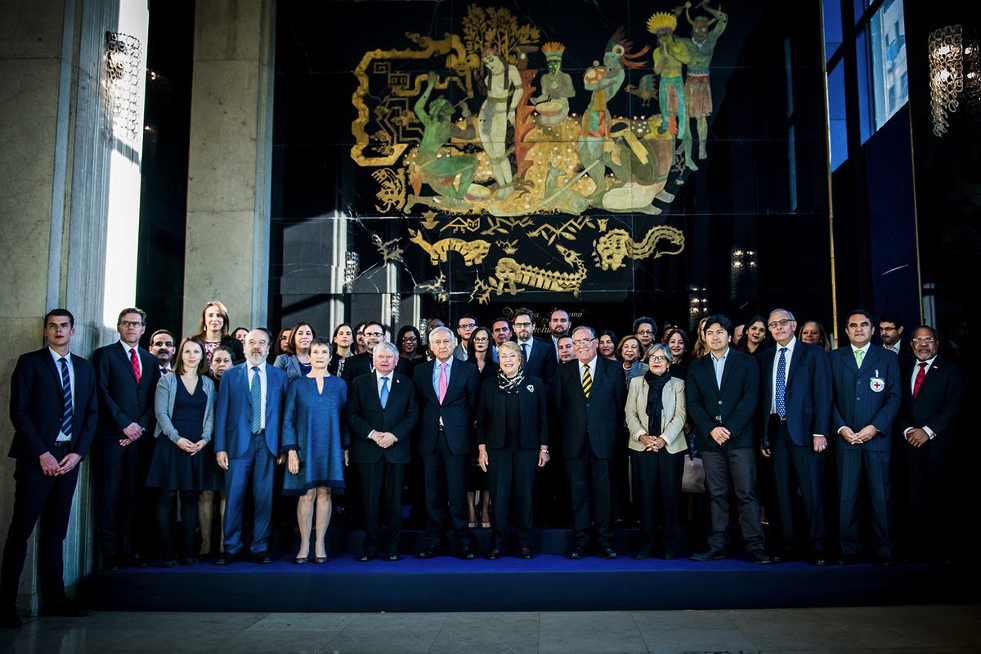Latin America
Following decades of human rights violations, armed conflict and military rule that defined the 1970s and 1980s, countries within the Latin American region are confronting their human rights legacy. As countries have transitioned away from conflict and oppressive governments towards peace and democratic rule, the region has pioneered diverse transitional justice models aimed at national reconciliation and rebuilding, and is implementing human rights-based frameworks for effective governance.
As many Latin American countries are currently undergoing efforts to professionalise their police and prison services with a view to preventing and reducing risks of torture and ill-treatment, the UN Convention against Torture remains a key guiding roadmap and framework to support the adoption of new laws, policies, practices and procedures.
Galvanised by political action and commitment towards a new culture of respect for human rights, the CTI Core State of Chile leads CTI’s work in Latin America. In the region, CTI is engaging with other Latin American countries to support:
- Anti-torture legal, institutional and policy frameworks;
- Torture prevention policies and strategies in policing and law enforcement;
- Capacity-building in prison reform and management.
Regional ratification in Latin America
The ratification of the Convention against Torture added to the painful experience of Chile’s recent past, allowed the political structures of the State to gradually become more aware of the value of human dignity and the urgent need to prevent and punish torture and cruel, inhuman or degrading treatment.
H.E. Lorena Recabarren, Chile’s Under-Secretary for Human Rights, speaking before the UN Committee against Torture during Chile’s sixth periodic review, July 2018.
Building and strengthening anti-torture legal, institutional and policy frameworks

Latin American countries have built solid anti-torture legal frameworks to give effect to their obligations under UNCAT and the various regional human rights instruments prohibiting torture and ill-treatment, including the American Convention on Human Rights (AHCR), the Inter-American Convention to Prevent and Punish Torture (IACPPT) and the Inter-American Convention on the Prevention, Punishment and Eradication of Violence against Women (“Convention of Belem do Para”). In their collective efforts to ameliorate the past, almost all countries have enshrined the prohibition against torture and ill-treatment in their Constitutions and made torture a punishable criminal offence. All countries have enshrined the obligation to exclude evidence obtained by means of torture in national law. Adapting to national contexts, a number of Latin American countries have adopted broader definitions of torture to encompass acts perpetrated by non-State or private actors, crimes related to gender-based violence, and to recognise specific forms of discrimination.
In support of the region’s continued progress and to foster inter-regional dialogue and cooperation, CTI convened a regional seminar in Santiago in April 2017, opened by then President Michelle Bachelet, during which 14 Latin American countries shared good practices, experiences and challenges in building anti-torture legislative and institutional frameworks. CTI is committed to supporting Latin American countries in drafting anti-torture legislation and strengthening anti-torture legal, institutional and policy frameworks.
Read more on Latin American torture-related laws here.
Preventing torture and ill-treatment in policing and law enforcement
As in other regions, developing and consolidating human rights-compliant policing is a priority in Latin America. Latin American States have taken part in a number of CTI events that have focused on this important issue, and have also shared their practices, techniques and experiences in relation to:
- Implementation of legal and procedural safeguards against torture and ill-treatment during the first hours of arrest and police custody;
- Lawful use of force and firearms as a means of restraint during arrest, in custody processing, as well as in relation to protests and assemblies;
- Use of rapport-based investigative interviewing of suspects, witnesses and victims.
CTI supports States in strengthening the effectiveness and professionalism of police and law enforcement services to assist countries in their torture prevention and response efforts.
Capacity-building for prison reform and management policies and strategies
Countries in the Latin American region have highlighted that some of the most pressing issues requiring attention include prison overcrowding, poor material and living conditions of detention and the increase of women as one of the fastest growing prison population groups. In CTI seminars, Latin American participants have shared several good practices aimed at redesigning prison management models in an effort to decongest prisons, improving detention conditions and prioritising alternatives to imprisonment. The work is steadfast and encouraging, but significant challenges remain.
CTI is ready to provide technical assistance to interested Latin Americans wishing to embark on prison reform strategies, such as through seconded thematic experts who are able to undertake reviews of prison management and detention conditions, offering confidential recommendations to the government, or referral to our expert network.

